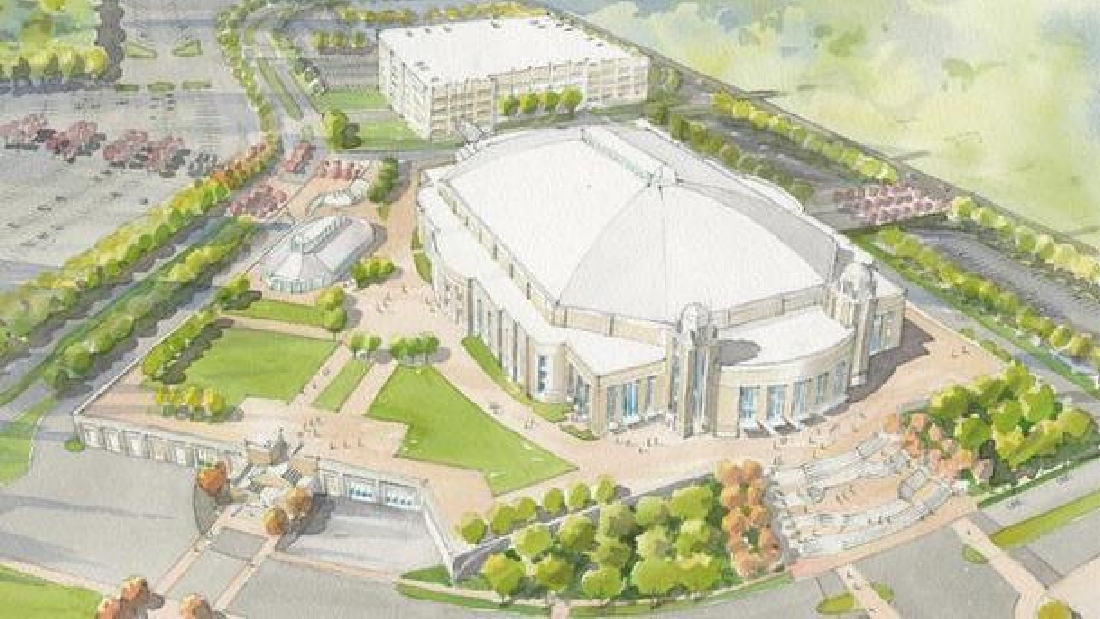Mayor Betsy Price is on television a lot these days. She stars in a commercial pushing three ballot proposals for funding a multi-purpose arena planned for the Cultural District. She even has a memorable catchphrase, touting the arena as “definitely Fort Worth it.”
She’s not alone in that opinion. City officials have gushed over its potential impact on the economy and the fact that the city would have to foot only half of the bill.
The price tag on the 14,000-seat facility could exceed $450 million. The building would be owned by the city and managed by the nonprofit group Event Facilities Fort Worth, which would pay the other half of the bill, including any cost overruns. That group is led by local powerbroker Ed Bass, who spearheaded the charge to build the arena.
For years, Fort Worth has been losing major concerts and sporting events to other cities because the outdated Will Rogers Memorial Center and the Fort Worth Convention Center can’t accommodate them. The new arena will almost certainly put Fort Worth back on the big-events radar.
But not all observers agree with Price’s catchphrase. They have questions about the arena’s cost, its impact on the neighborhood, and the way the city — literally — paved the way for the arena with taxpayer money. The city spent millions on infrastructure years before the Fort Worth City Council voted to put the arena initiatives on the ballot, with minimal public discussion.
Nearby residents are concerned about parking and traffic safety, the same issues the city failed to address when the council decided to charge for parking in its Cultural District lots in 2010. That change has driven patrons of the Cowgirl Museum, Fort Worth Community Arts Center, Science and History Museum, the Will Rogers complex, and the trio of art museums into the neighborhood to look for free parking. Residents are frustrated that the city hasn’t included them in the planning of the complex and has refused to show them the project’s master plan.
Jim Wietholter lives in Arlington Heights and supports the arena but said his neighborhood is already full of cars every time there’s an event in the Cultural District. He’s worried that the arena will make a bad situation worse.
“Come over here when there’s a major event at Will Rogers,” he said. “Every street within a quarter-mile [of the memorial center] is full. People don’t want to pay the parking fee, and I don’t blame them. [The city] hasn’t solved it now; how are they going to solve it when it gets worse?”
The arena, to be built on the southeast corner of Harley Avenue and Gendy Street south of the Will Rogers Memorial Center, has also drawn criticism from people who don’t live anywhere near it. They question why the cost is so high compared to similar event centers. The cost of the arena even makes the Cowboys’ huge Arlington stadium look like a bargain. AT&T Stadium has almost 10 times the capacity of the proposed Fort Worth arena but only three times the price tag.
Concerned resident and budget-watcher Elizabeth Matlock said she, like Wietholter, is in favor of the arena. But she became concerned when city officials couldn’t answer her questions as to why the expected cost is significantly higher than most other arenas around the country.
“I’m not against development and improvement, but I am opposed to the price tag for this,” she said.
The proposed arena would hold 14,000 people for concerts and about 9,000 for rodeos and sporting events. It will cost 20 percent more ($100 million) than a similar-sized one on the Las Vegas strip that has a 20,000-seat capacity. The Intrust Bank Arena in Wichita, Kan., can hold nearly 16,000 people but will cost only half of what’s being planned in Fort Worth. Construction began on the Vegas arena earlier this year; the Intrust arena was built in 2010.
City officials didn’t respond to multiple interview requests by Fort Worth Weekly.
Supporters of the project tout the fact that the city’s financial obligation is capped at $225 million, thanks to the investment by Event Facilities Fort Worth. The public portion of the funding would come from taxes on ticket sales, parking, rentals of stalls used for livestock, plus the city’s portion of the hotel taxes generated within three miles of the location.
The funding is dependent on voters approving those taxes in the Nov. 4 election. Combined, the three measures would allow the city to kick in cash for the arena and improvements to the surrounding streets and other nearby facilities.
At a recent public meeting to discuss the arena, a city official told the crowd that if the voters don’t approve the tax measures, the project will still move forward with alternate sources of funding.
Before the city council voted to put the initiatives on the ballot, the city had almost completed the new Trail Drive just south of the Will Rogers Memorial Center. The four-lane street with fancy landscaping cost taxpayers more than $15 million — twice the price of a normal street — and for now leads only to a parking lot. Arlington Heights residents said they have asked to see a master plan for the project for months, but the city hasn’t produced one.
Wietholter said he’d like to see where the Montgomery Street entrances will be. He fears the road will bottleneck and traffic will spill into their neighborhood.
“I bet you the traffic will back up to I-30. How are we going to improve traffic flow?” he said. “How are we going to get enough cars off of I-30 and get them into the lots and back out, without them coming down my street?”
City council member Dennis Shingleton proposed a plan that would put the Arlington Heights neighborhood association in charge of issuing parking permits.
Association president Jessica Redman said her organization is not a parking authority. “We know from experience that doesn’t work,” she said. “All you have to do is look at the TCU area on a Saturday afternoon.”
Patricia Ward said that when the new garage was built in 2009, residents suggested the city barricade the entrances to their neighborhood on the days of big events. Then-council member Carter Burdette told her that the residents would have to shoulder the cost.
“We met with the city five or six years ago,” she said, “and it seems like every time we raise concerns, the city listens to us, but nothing is ever done.”
Neighborhood leaders have resorted to looking for solutions on their own. They have contacted officials from Event Facilities Fort Worth and the Fort Worth Stock Show and Rodeo directly.
But they haven’t completely cut out the middleman. They and Shingleton have formed a committee to survey the neighborhood about support for a parking-permit system. The committee will meet in a few weeks and then host a larger meeting open to the public.
Redman said the residents just want their concerns heard.
“We keep asking for a seat at the table,” she said. “We’re the neighborhood that will be impacted. We want to discuss parking; we want to know what they are planning. We keep asking to see the master plan. You don’t spend $450 million without one.”
Wietholter and others are frustrated that the city is bum-rushing the public before the details are all sorted out.
“Basically this is, ‘Let’s vote for it and then solve the problems,’ ” he said.













If only there were such a concerted, motivated push to provide basic city services. Animal Control, for example, is a hollow skeleton of an underfunded agency. A recent call reporting free-ranging dogs on a Fort Worth neighborhood street became priority 401—i.e., there were only 400 calls ahead of the free-ranging dog pack.
A mega arena holds little appeal, but a safe, quiet neighborhood sure would.
Almost everything you need to know about why this is being done will be found in who is behind Event Facilities Ft. Worth. Like everything else that the Bass’ have done in Ft. Worth, their first priority is how much money they will make. Why would you put the cities premier arena/concert/ anything else facility so far from hotels if you didn’t have plans in place to build hotels in the area where there aren’t many. That means that businesses will be torn down or the neighborhood will be bought up at rock bottom prices after it’s declared blighted by the city and the hotels built on the ruins of small businesses or family homes.. The idea of existing hotels within a 3 mile area paying a significant amount of revenue seems ridiculous. That 3 mile limit doesn’t reach downtown where the city just built a new hotel. Parking at the complex is already too high. Increasing with additional taxes can price it beyond what many people can afford. Does the Will Rogers complex need a new arena- yes. What it doesn’t need is this deal. We need something that will give us a new arena at Will Rogers and a new one downtown near the existing hotels so that we can attract new business at Will Rogers and conventions and concerts downtown. This was rushed with too little real information given to the public. It’s been my experience when that happens it’s because vital negative to the project information is being hidden. Say no on this and let’s go back and reevaluate what’s needed and how much it will really cost.
I recall one of the reasons floated around some years back for the mysterious old money power broker-led killing of the streetcar project was that certain rich old people in town didn’t want such a transit project competing for the hearts and minds of the public with this new arena (even though the two had nothing to do with each other, money-wise). Read about it in the Weekly, in fact.
Years later, it certainly seems stupid and shortsighted to have killed a project to radically improve central-city transit for a comparatively tiny price tag, while being about to dump half a billion dollars into an undersized cowboy arena.
I totally forgot about that.
Two simple words: Republic boondoogle.
So the big lie won again. Sorry for the folks in the neighborhoods west of the new arena. I hope when you’re forced to sell your newly classified blighted homews that you get enough to resettle somewhere else.